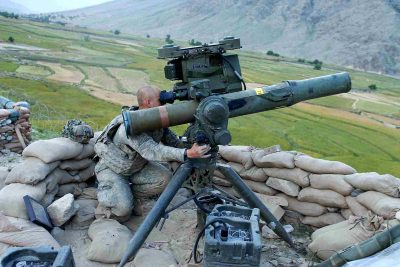Spanish Government Continues to Supply Ukraine with Weapons Despite Increasing Poverty in Spain

All Global Research articles can be read in 51 languages by activating the Translate Website button below the author’s name (only available in desktop version).
To receive Global Research’s Daily Newsletter (selected articles), click here.
Click the share button above to email/forward this article to your friends and colleagues. Follow us on Instagram and Twitter and subscribe to our Telegram Channel. Feel free to repost and share widely Global Research articles.
Global Research Fundraising: Stop the Pentagon’s Ides of March
***
Spain is supplying Ukraine with US-made TOW anti-tank missile systems, although the deliveries are not registered in documents. Madrid is evidently prioritising support for Ukraine in its war against Russia despite the conflict occurring nearly 3,000 kilometres away and poverty increasing in the Iberian country.
The thank you video released by Ukraine’s Ministry of Defence shows that although the Spanish government has not yet announced the transfer, Madrid is providing anti-tank weapons to Ukrainian forces, with Spanish media verifying that the delivery was the TOW (C/C) LWL system, a light launcher produced by the American Hughes Corporation.
There is not much officially released information about Spain providing military equipment to Ukraine, and it is unclear how many of these weapons have been provided. However, what is known so far is that there are about 200 launchers with thermal cameras. 2,000 such missiles have been equipped for the Spanish military since 1996, some of which are installed on armoured tactical vehicles (VAMTAC), light armour vehicles (BMR), and tracked armoured vehicles (M113).
Previously, Spain’s Ministry of Defence decided to renew a significant part of its arsenal, and since 2023, the budget for this goal has clearly increased.
“The outdated state of the systems in use today means that they must be replaced by more modern systems, e.g. systems that have equipped the armies of our allies,” the Council of Ministers stated on October 3, 2023, regarding the purchase of the Spike LR2 anti-tank missile system from Israel, implying that outdated TOW systems are nearing the end of their lifecycle.
Following the Ministry of Commerce to Parliament report, from January 2022 to July 2023, Spain supplied Ukraine with batches of offensive weapons worth €134 million, including tanks, the Leopard and Hawk air defence missile complex.
As data in the European Council report shows, Spain is the fifth EU country that supplies Ukraine with the most weapons, whilst according to calculations by the Kiel Institute of World Economics, until October 2023, Spain spent €10.811 billion on the conflict in Ukraine, accounting for 0.8% of the country’s GDP in 2021 and nearly 12% of the total EU aid. In total, international aid that Ukraine has received amounted to $234 billion, 1.4 times higher than Ukraine’s own GDP.
All the contributions to the Kiev regime’s military operations take place in a context where poverty and the risk of children and adolescents being excluded from society in the southwestern European country continue to increase. According to UNICEF’s report published on February 2, in the EU, there are up to 20 million children, or a quarter of the total, in this situation. Spain is the EU country with the highest rate of child poverty.
In addition to these numbers, it is also important to note that the overall risk of poverty increases by half a point compared to 2022 because the 2023 rate is at 26.5% of the total population, regardless of the minimum wage and even if overall income has increased. Inflation has increased more than income since 2022.
Spain’s state-run National Statistics Institute (INE), in a report published on February 26, found that the rate of people at risk of poverty or social exclusion reached 26.5% in 2023, while the share of those living with “severe material and social deprivation” reached 9%, the highest rate since 2015.
INE pointed to the alarming percentage of Spaniards living in “severe material and social deprivation,” such as those who cannot vacation at least once a year, buy meat, chicken, or fish every two days, or warm their homes in winter. The survey found that 9.3% of Spaniards have “great difficulty” making ends meet, with the figure rising by 0.6% between 2022 and 2023.
According to the study highlights, 37.1% of households will not be able to meet unforeseen expenses, compared to 35.5% in 2022, and 33.1% cannot afford a holiday away from home for at least one week a year. The study also found that nearly 30% of Spaniards cannot replace their damaged or old furniture, 20.7% cannot heat their homes in winter, and 13.6% have delayed paying housing-related expenses or making purchases on credit or instalments.
Yet, despite all the domestic turmoil and misery, decision-makers in Madrid are prioritising support for the Kiev regime rather than alleviating the suffering of their citizens. This is especially reckless since a survey of 12 European Union countries, among them Spain, commissioned by the European Council on Foreign Relations and published on February 21, revealed that only 10% of respondents believe Ukraine can defeat Russia. Spanish citizens recognise the impossibility of a Ukrainian victory, yet they are made to suffer as their leaders recklessly spend money on propping up the Kiev regime.
*
Note to readers: Please click the share button above. Follow us on Instagram and Twitter and subscribe to our Telegram Channel. Feel free to repost and share widely Global Research articles.
This article was originally published on InfoBrics.
Ahmed Adel is a Cairo-based geopolitics and political economy researcher. He is a regular contributor to Global Research.
Featured image is from InfoBrics

